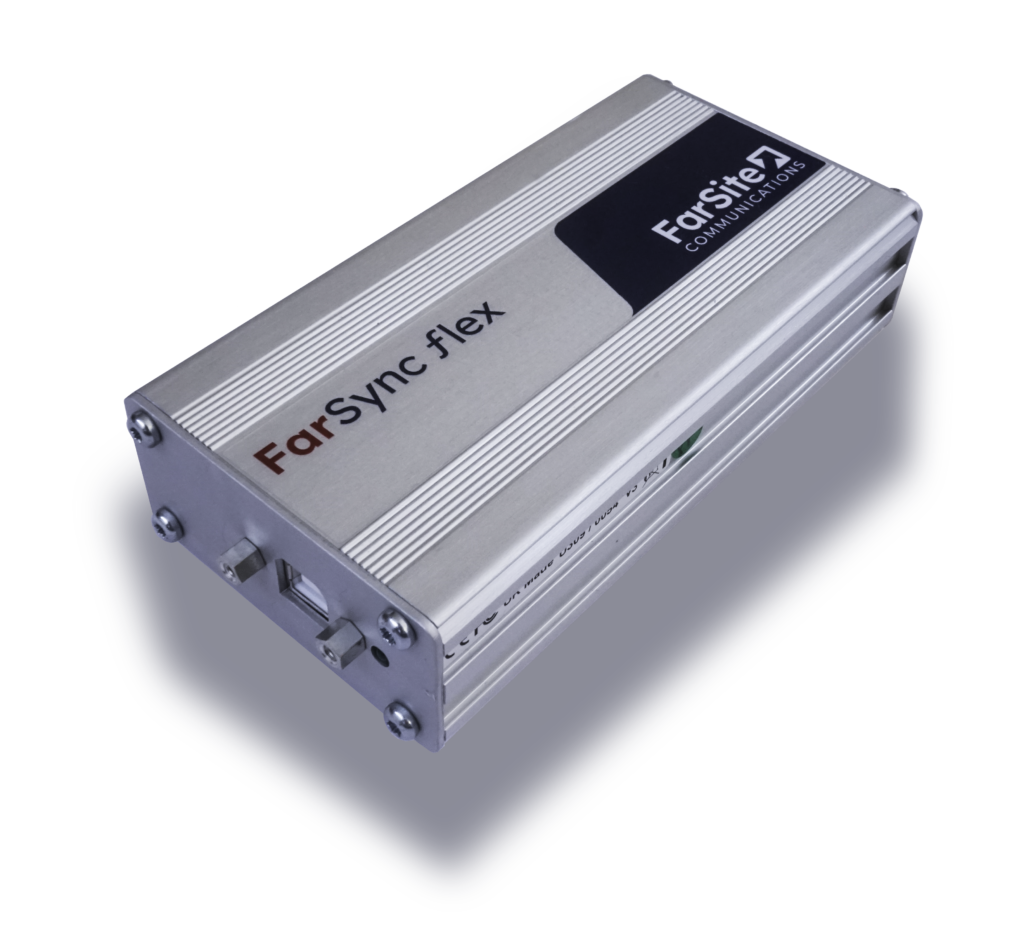Troubleshooting guide:
FarSync drivers — Linux
This guide is suitable for the FarSync T-Series and USB products for Linux, where actions are version specific this is noted in the action.

Introduction
For most users the FarSync Drivers product installation on Linux is quick and trouble free. There are however a very large number of versions of Linux in use together with a large number of kernel variants, this can give rise to problems getting the product working correctly in all configurations. This guide has been put together by the Support team at FarSite with the aim of helping users to quickly resolves issues which have been encountered before. Many of the problems appear to have been ‘one offs’ but they have been included just in case.
FarSite makes every effort to ensure that installation and configuration of our products is quick and trouble free on the widest possible variety of installations. If you have any suggestions to help us achieve that aim we will be pleased to hear from you, just send an email to moc.etisraf@troppus.
Installation
| Problem Symptom | Possible Cause(s) | Action |
|---|---|---|
| There are compile errors during the install process for the fsflex.c and farsync.c driver source files. | From time to time the internal Kernel API's change. This usually requires patches to be applied to the drivers to resolve the issue. | Check to see if these patches are available on the support pages of the web site, or contact moc.etisraf@troppus |
| There are no compile errors during the install process but there are unresolved symbols during link. | The OEM driver needs the syncppp module and the WAN driver needs the syncppp and hdlc modules to be present. It may be possible that you are installing on a distro that does not include these modules. | Check the install documentation for details on how to include the additional modules required. If this does not resolve the issue please contact moc.etisraf@troppus |
| The farsync or flex driver driver will not start | The slot in which the FarSync T-Series adapter has been installed is damaged. | Try installing the adapter in another slot. It may also be advisable to uninstall and reinstall the FarSync software with the card in its new location. |
| The adapter is not making good electrical contact with the PCI slot. | Make sure that the contacts are clean. If necessary, also try installing the adapter in another slot. | |
| The FarSync driver files are somehow corrupted or missing. | Uninstall and reinstall the FarSync software. | |
| The installation of the software failed in some way. | See further details for checking the installation. | |
| System uses Secure Boot | FarSite modules require to be signed. See signing instructions which details how to sign FarSite modules for Secure Boot. | |
| The FarSync T-Series adapter is faulty. | The T-Series cards are very reliable, the adapter is very unlikely to be faulty. Try downloading and running the FarSync T-Series card test software to check the card (requires DOS). If, however, you do believe it to be faulty please return the adapter to FarSite for repair or replacement. |
|
| The original CD-ROM supplied with the product cannot be read without errors | The FarSync product CD-ROM has become damaged or the CD reader being used is out of alignment or faulty. | Download the drivers from the FarSite web site, see Software Downloads |
farutil application
| Problem Symptom | Possible Cause(s) | Action |
|---|---|---|
| Segmentation error when using the farutil command | The C runtime libraries on your system may not be up to date. | Please ensure that you have the latest libraries installed. |
farutil command on hdlc0/sync0 reports the following error farutil: Problem getting port information. No such device | farsync or hdlc/syncppp modules did not load After Kernel version 2.6.18 the hdlc module was further divided into a sub module per protocol. It may be that you need to load the appropriate sub module. | use the following command to check module dependencies:
If unresolved symbols are reported for farsync.ko and syncppp.ko in the /usr/src/linux/drivers/misc directory then delete these files. (They belong in the net directory, and the ones in misc are just left lying around, but are being picked up first). Try depmod -a again. and if there are no unresolved symbols for farsync.ko and hdlc.ko/syncppp.ko then see if the farsync module will now load. Use the following command: modprobe farsync if no errors are reported use the following command to see if the module has been loaded: lsmod You should see the farsync and hdlc/syncppp modules listed. To load hdlc submodules use modprobe or insmod on one of the following modules as appropriate:
etc. |
| No aliases or wrong aliases in /etc/modules.conf | Make sure the following lines are in the /etc/modprobe.conf file (2.6 Kernels) or /etc/modules.conf file (2.4. Kernels) alias hdlc0/sync0 farsync alias hdlc0/sync1 farsync |
Additional possible farutil problems when using the Generic HDLC interface (2.4 kernel versions of 2.4.13 and above only)
Interface enabling
| Problem Symptom | Possible Cause(s) | Action |
|---|---|---|
| The interface won't come up on Boot | Drivers not loaded | Check that the LED's are green on the FarSync card. If they are not green check the following. |
| ONBOOT=no | Check that the ONBOOT parameter is set to Yes in the ifcfg-sync0 file. |
Additional possible interface enabling issues when using the Generic HDLC interface (kernel versions 2.4.13 and above only)
Configuration
Frame Relay
Normally your ISP provider will supply you with the operating parameters you require. However, if you are experimenting and connecting two PC’s together you should bear the following in mind.
- One end of the link should supply the line clock. At one end set CLOCK=ext in the ifcfg-hdlcX file.
- One end needs to be LMI DTE and the other LMI DCE. At one end set DCE=y in the ifcfg-hdlcX file.
- Use a dlci number of 16 and above. You are not prevented using any dlci, but remember that some are reserved.
- If your ISP only supports Cisco’s LMI protocol, then turn off LMI altogether by setting LMI=none in the ifcfg-hdlcX file.
Connectivity
| Problem Symptom | Possible Cause(s) | Action |
|---|---|---|
| Kernel Oops when the command ifup/farifup hdlc0 is used | There were several releases of the 2.6 Kernel which had this bug, i.e. versions 2.6.23 to 2.6.25 inclusive. | Update to a later Kernel. |
| No response from ping | Cable not plugged in | Make sure this cable is inserted to correct port A or B on the 2 port card and A, B, C or D on the four port card |
| Remote address not correctly specified | Check that you are pinging the address as specified in the POINTOPOINT configuration parameter | |
| Clock not present | Check that the correct (port wise) green LED is flashing while attempting to ping. Does the farutil command report that a clock is detected? If you have configured the clock source as external, then you are not receiving clock from your Service Provider, or you have a cable problem. |
|
| Firewall issues | Check the firewall settings on the local and remote ends of the connection. The firewall settings may be preventing the ping from working. Use a network monitoring tool, such as tcpdump, to see if there is any tx or rx activity. We also supply a simple monitor utility called farmon that will dump in hex any frames passing through the driver. Change to the common/ directory and type "make farmon" to build it. |
